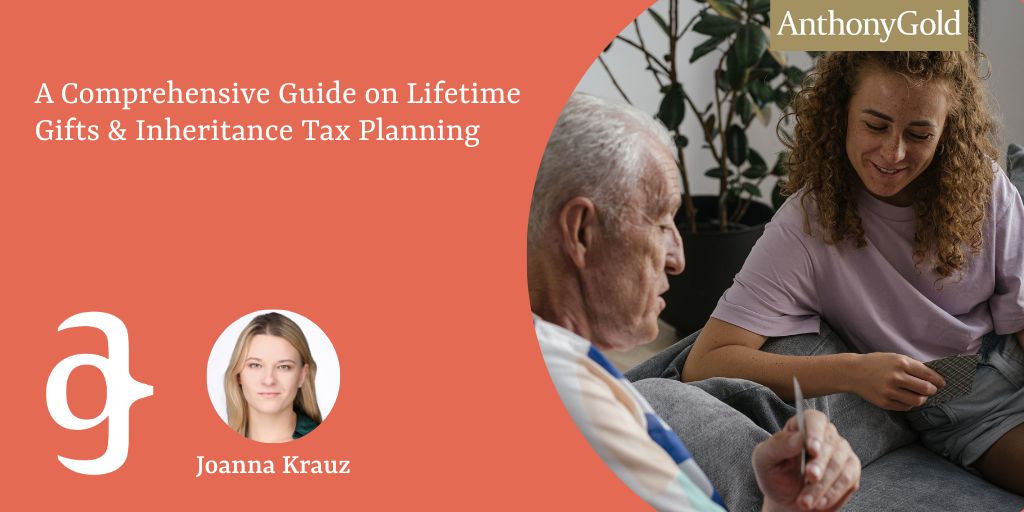Lifetime Gifts and Inheritance Tax Planning: A Comprehensive Guide

When planning for the future, one key consideration is how to minimise the impact of Inheritance Tax (IHT) on your estate. Lifetime gifts can be a useful tool in reducing the tax burden on your loved ones, ensuring that more of your wealth is passed on to them rather than to HMRC. However, without careful planning, lifetime gifts can come with their own set of complexities and potential pitfalls.
Lifetime gifting has become a particularly relevant topic during festive periods like Christmas, when generosity is often front of mind. While giving presents is common during the Christmas season, many overlook the strategic role gifting can play in estate planning. Whether you are considering gifts for special occasions or year-round transfers of wealth, understanding the rules governing these gifts is essential to ensuring they are used to your advantage.
This guide will outline how lifetime gifts can impact the IHT liability, detailing the rules that govern them, and the exemptions and reliefs available. By familiarising yourself with these principles, you can make the most of gifting opportunities and protect your estate for future generations.
What Are Lifetime Gifts?
In the context of estate planning, a lifetime gift refers to any asset you give away while you are still alive, whether that be money, property, or valuable items such as jewellery or shares. Lifetime gifts can play an important role in reducing the value of your estate and, by extension, the amount of IHT payable after your death.
Common examples of lifetime gifts include:
- Cash gifts to family members or friends.
- Transferring property ownership.
- Gifts of significant personal assets, such as cars, artwork, or shares.
How Does Inheritance Tax Apply to Lifetime Gifts?
Inheritance Tax is a tax on the estate of someone who has passed away, and it applies to the value of their assets above a certain threshold. For most individuals, the IHT threshold (or “nil-rate band“) is £325,000. Any estate value over this threshold is usually taxed at 40%.
Lifetime gifts can reduce the size of your taxable estate, thus lowering your IHT liability. However, there are important rules to keep in mind. The most significant of these is the Seven-Year Rule. This rule states that any gifts made more than seven years before your death are exempt from IHT. However, if you pass away within seven years of making a gift, it may still be subject to tax.
To complicate matters further, the rate of tax payable on a lifetime gift decreases gradually over the seven-year period. Known as taper relief, this mechanism provides partial tax relief based on how long ago the gift was made. The closer the gift was made to the date of death, the higher the tax rate that will apply. Another complication is that without careful planning the 7-year rule can extend to 14-year rule. The 14-year rule comes into play when an individual makes a gift into a trust and, less than 7 years later, makes a gift to an individual. This is a complex area, so it is best to seek advice when contemplating making substantial gifts.
By understanding and leveraging these rules, lifetime gifts can be a powerful tool for IHT planning, but careful consideration must be given to timing and the value of assets involved.
What Are the Exemptions and Reliefs on Lifetime Gifts?
When making lifetime gifts, certain exemptions and reliefs can help reduce or eliminate the tax liability associated with them. These exemptions are vital in ensuring that you make the most of your estate planning strategy while avoiding unnecessary tax complications.
| Exemption | Details |
| Annual Exemption | You can give away up to £3,000 per year tax-free. You can carry over unused allowance from the previous year. |
| Small Gifts Exemption | Gifts of up to £250 per person are exempt, with no limit on the number of people who can receive this. |
| Gifts on Marriage or Civil Partnership | Gifts up to £5,000 for children, £2,500 for grandchildren, and £1,000 for anyone else are tax-free for weddings or civil partnerships. |
| Gifts to Spouses or Civil Partners | Unlimited tax-free transfers between spouses or civil partners, provided both are UK residents. |
| Charitable Gifts | Gifts to UK-registered charities are tax-free. Leave 10% of your estate to charity and reduce the overall IHT rate to 36%. |
Understanding and utilising these exemptions is crucial for reducing the tax burden on your estate and ensuring that your gifts pass to the intended recipients tax-free.
In addition to the above, lifetime gifts which qualify as part of your normal expenditure out of surplus income are also exempt from inheritance tax. Given that the exemptions for other lifetime gifts are fixed, the exemption for gifts out of surplus income is an invaluable inheritance tax planning tool for those that have surplus income.
Exemption for Gifts Out of Surplus Income: Key Conditions and Considerations
To qualify as a gift out of surplus income and be exempt from IHT, several conditions must be met:
Firstly, the gift must be part of your normal expenditure.
It will be necessary to show a commitment to make regular gifts in order to satisfy MRC that the gifts were part of your normal expenditure. With Bennett v IRC [1995], the courts clarified that these gifts need not be recurrent but should be made with an intention to continue, allowing even the first gift to qualify for this exemption.
Secondly, you have made the gift out of your income after tax.
Hence, a gift of capital assets such as jewellery or securities does not qualify unless it was specifically purchased from income with the intention of making the gift. Examples of income will include interest from savings, dividend income, pension income, rental income or income payments received from a trust.
To avoid any pitfalls with this condition, keep detailed records of your income, expenditure, and gifts. If you prepare your income tax returns, these can help identify income sources, but ensure you also account for all forms of income, including those not included on the tax return, such as ISAs.
Thirdly, you must have been left with enough income to maintain your usual standard of living.
Hence gifts, even if made out of income, will not qualify for exemption if you had to resort to capital to meet your normal living expenses.
By meeting these conditions, you can ensure that gifts made from your surplus income are exempt from IHT, helping reduce the tax burden on your estate while supporting your loved ones. This method offers an efficient way to reduce your estate without worrying about the seven-year rule or other IHT complexities.
What Are the Practical Steps for Lifetime Gift Planning?
Making lifetime gifts part of your inheritance tax strategy involves careful planning and execution. Here are some practical steps to ensure the process goes smoothly:
Keep Detailed Records
It is essential to keep accurate records of all lifetime gifts, including the date, value, and recipient of each gift. These records will be necessary for your executor to determine whether any tax is due and to claim any applicable exemptions.
Plan with the Seven-Year Rule in Mind
When making larger gifts, plan well ahead to take advantage of the seven-year rule. This can significantly reduce the potential IHT liability on your estate if you survive for more than seven years after the gift is made.
Seek Professional Advice
Given the complexities of IHT and the legal considerations involved in gifting, it’s advisable to consult with a solicitor specialising in estate planning. They can help you navigate the rules and ensure that your strategy is tailored to your specific needs.
Lifetime gifts are a valuable tool for reducing the size of your taxable estate and managing your inheritance tax liability. By understanding the exemptions, potential pitfalls, and the role that trusts can play, you can take proactive steps to protect your wealth and pass it on to future generations with minimal tax implications.
Effective inheritance tax planning requires foresight and careful consideration of your personal circumstances. For tailored advice and assistance with lifetime gift planning, our expert solicitors at Anthony Gold’s Wills, Trusts, and Estates department are here to help.
To learn more about how lifetime gifts can benefit your estate plan or to get started with inheritance tax planning, contact us on 020 7940 4060 or email us at mail@anthonygold.co.uk.
* Disclaimer: The information on the Anthony Gold website is for general information only and reflects the position at the date of publication. It does not constitute legal advice and should not be treated as such. It is provided without any representations or warranties, express or implied.*
No comments